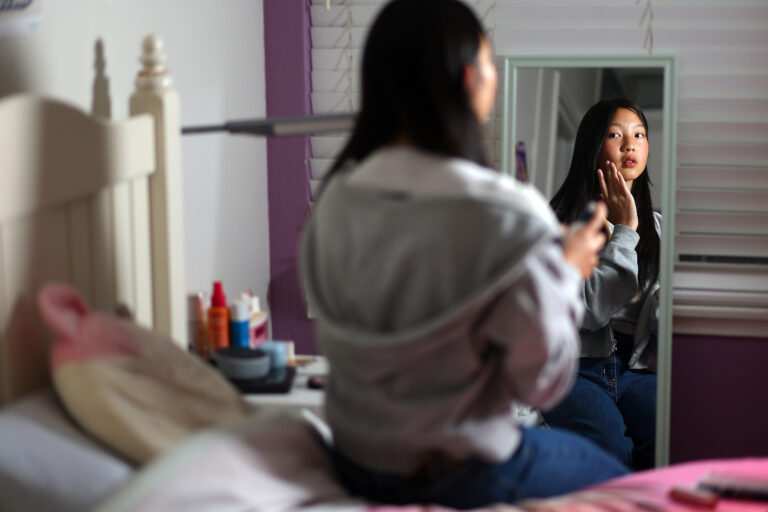
As a 14-year-old interested in skin care, Emily Chan thought dabbing her face with her mom’s fancy anti-aging products would help nourish her skin.
What she didn’t know was that the creams contained ingredients such as retinol and hyaluronic acid. Both can improve the appearance of fine lines and wrinkles by increasing skin cell production, but they also can cause irritation that results in redness and itchiness, especially on young skin.
The Palo Alto eighth-grader learned that the hard way when her face started turning red and blotchy.
“I would use her products without knowing my skin was pretty sensitive,” Emily said. “Now I have to be careful about the products I’m using.”
While anti-aging products are generally intended for those over 30, Emily said she often sees teenagers buying and using them in social media videos. That’s why she’s supporting a bill introduced last month by state Assemblymember Alex Lee, a 28-year-old Milpitas Democrat, that would ban the sale of anti-aging skin care or cosmetic products containing certain ingredients like retinol to children under the age of 13.
More and more children and teenagers are being exposed to adult skin care products through social media and purchasing them at trendy retail stores, a phenomenon dubbed “Sephora Kids” after the popular beauty products store. The anti-aging product market was estimated to be 10.14 billion in 2023 and is expected to reach 16.38 billion by 2030, according to a January market research report.
Using products containing retinols and acids at a young age can lead to eczema and irritant contact dermatitis, according to Sunil Dhawan, a dermatologist with the Center for Dermatology, which has locations in Milpitas and Fremont.
“There are more kids who we are seeing as patients that have multiple regimes and stuff that they are doing, for no good reason other than (seeing it) on TikTok and Instagram,” Dhawan said. “It’s amazing how they refuse to accept the fact that it’s the product that’s making their eczema worse, because they are using harsh retinol-based products which are not suitable for young kids and young sensitive skin.”
If passed, AB 2491 would require businesses to take steps to uphold the ban, including placing a notice next to products or online descriptions indicating they are not meant for anyone under 13, or requiring purchasers to verify their ages with an ID.
“That’s why (this bill) is going after the sale of anti-aging products,” Lee said. “because right now it’s super easy for kids to walk up and buy it off of the shelf.”
But the Personal Care Products Council, a Washington, D.C. based trade association that represents hundreds of global cosmetics and personal care products companies, opposes the bill, calling it “a hastily drafted attempt to use legislative force to stop a social media trend. Every ingredient targeted by this bill is safe when used as directed at the appropriate age.”
The bill recently cleared the state’s Environmental Safety and Toxic Materials Committee, and is now headed to the Appropriations Committee, which reviews all bills with fiscal impact once they pass a policy committee.
While the proposal is a first for California, age-related cosmetic bans have been established in other places. In March, the Swedish pharmacy chain Apotek Hjärtat, which has about 390 pharmacies in Sweden, began restricting the sale of advanced skin care products including retinol and alpha hydroxy acids to customers under 15.
Carol Chan, Emily’s mother, who also supports the ban, said stores shouldn’t sell any anti-aging products to children. She hopes the bill will raise awareness about the importance of checking product ingredients.
“We just see the buzz words, like ‘anti-wrinkle’ and ‘anti-aging,’ and don’t realize what the actual ingredients are in there,” Chan said. “That’s scary; even I’m not conscious of it. I can’t imagine an 11- or 13-year-old really caring. They just say it smells good, it feels good, and it’s free — it’s on the counter of my mom’s bathroom, so I’m going to try it.”
But other youngsters have some reservations about implementing a full ban.
Thirteen-year-old Noga Arditi of Palo Alto thinks preteens should be able to choose whether to purchase cosmetic products.
“They should learn about (products) before they put it on their skin, but maybe not ban it totally from people,” the seventh-grader said.
Before deciding whether to support the bill, Palo Alto resident Ellen Payne said she would like to see more research conducted on the long-term effects of children using anti-aging products.
“I’m interested in learning more about the scientific basis of the bill,” she said. “The harmful effects (anti-aging products) have on the skin, and more on the social and psychological effects.”
Her 12-year-old daughter, Tessa, who sticks to using moisturizers and sunscreens, wonders why the “Sephora Kids” her age would even use such products in the first place.
“From the videos I’ve seen, they seem annoying. They don’t really need to use it,” she said. “They are already pretty young. They don’t need to look younger.”
___
© 2024 MediaNews Group, Inc
Distributed by Tribune Content Agency, LLC.
0 comments :
Post a Comment